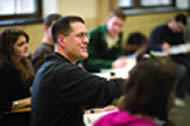
I live in a noisy room in Keenan Hall. It isn’t usually my gentlemanly neighbors making the noise, but a clanging heater and the people who pass along the sidewalk below my window. Voices from outside reverberate into my room, bringing the shrill musings or complaints of students returning home late from the library. I am the latest in a line of Holy Cross priests who have lived in this room, and certainly not the first who, awakened by such voices, asked himself, “What am I doing here?"
It’s a question I’ve asked myself before in religious life. I remember vividly how I felt when, during my second year in formation, I sat in a chapel many miles away from the wedding of one of my Notre Dame roommates, where I earnestly wished to be. A raucous phone call from the reception had made me laugh at my friends’ quirky humor, but sitting there I felt only wistful and sad. I pondered, “What am I doing here?"
That question echoed again two years later as I sat in another chapel of another Holy Cross seminary residence, this time in Dandora, a poor neighborhood in Nairobi, Kenya. That morning a restless voice was high-pitched and insistent: “Kollman! Where is Kollman?” A neighbor down the road was drunk again and wanted to see me after a night of revelry. His fist thundered against our metal door. “What am I doing here?” I thought, again many miles away from where I wanted to be. In this case my impulse was a longing to escape aggravation rather than to be in any particular elsewhere.
It’s a natural question at many points in life, certainly for people like me in their 40s. Answers at various levels are easy to provide. As a theology professor who lives in a residence hall, my days are full, but I often gratefully feel part of larger purposes, which give greater meaning to my doings.
My research and teaching connect me to prominent issues for the contemporary and future Church as well as for the Congregation of Holy Cross. I study Christianity in Africa, which represents one of the most dynamic edges of what scholars today sometimes refer to as “the world Christian movement"—a phrase crafted because the word “church” does not capture the fluid nature of the many ways people follow Jesus. I strive to understand the precise ways in which people respond to missionary practices of various sorts and how these practices produce—or fail to produce—Christian self-understandings.
This may seem a concern far from where I currently live and teach, but Notre Dame’s connections to Africa are many, and my interest in missionary practices connects me to the history of my order. Holy Cross has always been fundamentally a missionary congregation. The seven Holy Cross brothers who came here as missionaries with Father Sorin in 1842 were the second group of Holy Cross religious sent from France, the first having gone to northern Africa two years earlier.
Sorin and the others brought with them particular approaches to schooling and formation to virtue that derived from their French educational experiences. They were missionaries to a frontier and worked to create an orderly environment for the young men sent to them. The straight paths that cross Notre Dame’s quads are vestiges of the uptight spatial and temporal organization that characterized the ambitious social conditioning Notre Dame once embraced as its mission and has never fully renounced.
Any student of such things—and of student life at Notre Dame today—quickly realizes that missionary desires have rarely been fulfilled. Those evangelized—whether kings and their vassals in 7th century Britain, slaves in 19th century Zanzibar or undergraduates in 21st century northern Indiana—shape in profound ways the kinds of Christians they become. Yet even those who reject the Christian message or adapt it in ways that missionaries dislike are still affected.
And when I’m awakened in Keenan Hall by some screech from the sidewalk or listen to a student’s account of her discernment of her future or struggle to find the right words to complete an article for publication, I like to think I am a missionary, too, evangelizing in this time and place. Northern Indiana may not be the frontier it was in Sorin’s day, but our work here is not so different. We are missionaries here, too, participating in God’s work of refashioning the world and those who live in it through Christ and in the Spirit.
Father Kollman is a Notre Dame assistant professor of the history of Christianity. He is also a fellow of the Kellogg Institute for International Studies, the Kroc Institute for International Peace Studies, the Nanovic Institute for European Studies and moderator of the African Working Group at Notre Dame.